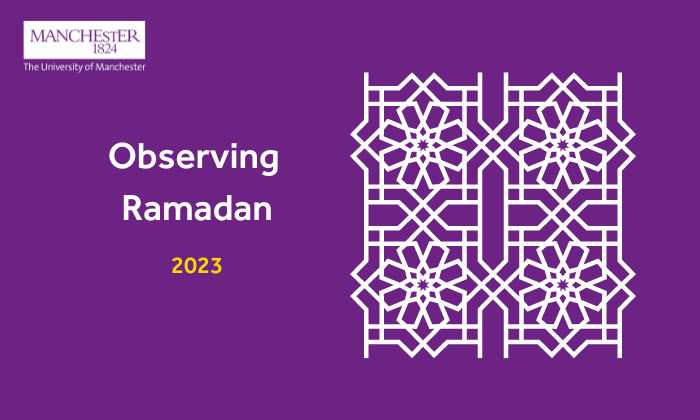Observing Ramadan - supporting employees and students
20 Mar 2023
What you need to know about supporting employees and students observing Ramadan

We aim to take a holistic approach that celebrates individuals and their many identities to ensure that we are truly inclusive of all our community. This is set out in our Equality, Diversity and Inclusion strategy.
As we approach Ramadan, we recognise this month long event and its importance to our Muslim community.
What is Ramadan?
Ramadan takes place in the ninth lunar month of the Islamic Calendar, when Muslims believe the Quran (Islamic holy book) was revealed to the Prophet Muhammed. It is a holy month for Muslims when they abstain from eating and drinking and any other physical needs during the daylight hours.
Ramadan is much more than not eating and drinking, it is a time to purify the soul, refocus attention on God, and practice self-sacrifice.
When will Ramadan take place?
Ramadan will commence on the evening of Wednesday, 22 March until the evening of Friday, 21 April 2023, depending on moon sightings.
What happens during fasting?
Over the course of the month, Muslims fast from sunrise, rising pre-dawn for the Suhour meal, until sunset when the fast is open or broken with a Iftar meal.
Fasting has been shown to demonstrate health benefits as well as an appreciation of what people have and a greater empathy for people in need.
Fasting is one of the Five Pillars of Islam and during this time, Muslims may increase activities such as:
Spending more time on prayers and reflection such as Tarawih. This is with the aim of increasing taqwa or a closeness to God;
Volunteering, giving to charity and acts of goodwill;
Sharing their Iftar food and experiences with family, friends, neighbours, colleagues, and people who will be observing Ramadan on their own.
How you can support a student or colleague who is fasting during Ramadan
Have a conversation with students and colleagues about their faith and experiences and ask if they require any support e.g. breaks for prayers or change to start times;
Where possible avoid early morning meetings or late evening (social) events which may affect Iftar and evening prayers;
Whilst Muslim colleagues and students may not object to food and drink being consumed in their presence, you may wish to avoid this and allow for flexibility for colleagues and students to have breaks where needed;
You can also make colleagues and students aware of the University-wide support available such as:
- the Multi-Faith Chaplains,
- the University Islamic Society ISoc,
- student wellbeing support;
- staff wellbeing support;
- relevant staff networks such as the BAME Staff Network.
